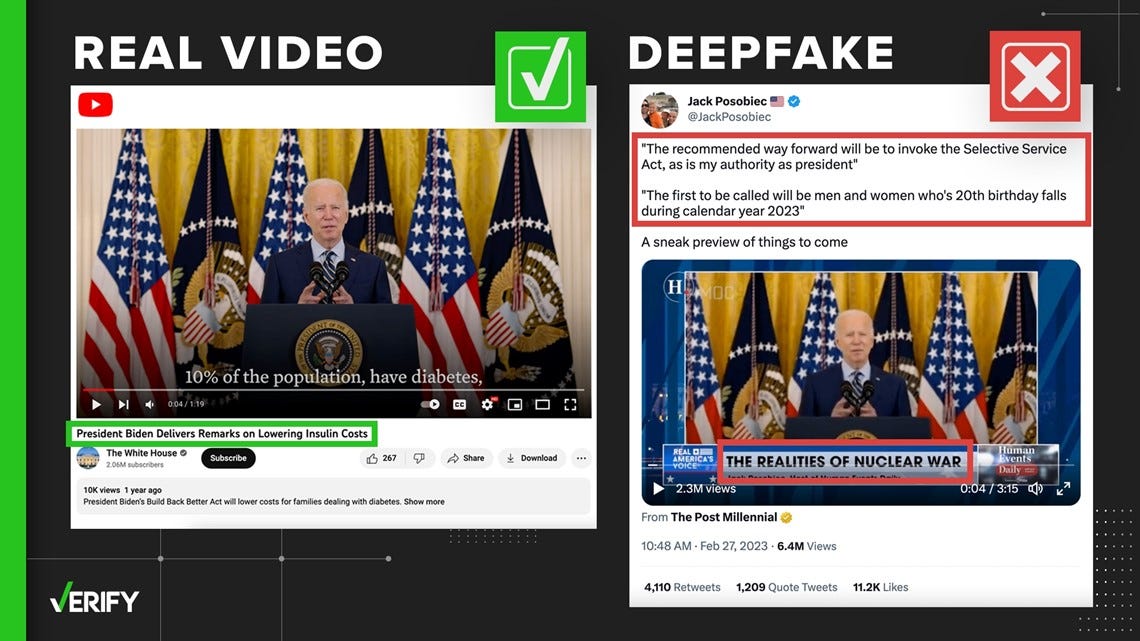The October surprise that will upend the presidential election
And not only are we refusing to prevent it, we just dismantled the only thing that was trying to save us. But there's still hope.
Welcome to the weekend edition of The Experiment, your official hopepunk newsletter. If you’d like to support my work, become a paid subscriber or check out the options below. But even if you don’t, this bugga free. Thanks for reading!
Republicans warned about an “October surprise” in 1980, darkly muttering that Jimmy Carter was going to win the release of the hostages in Iran in October just in time to win re-election. As it turns out, the hostages were released minutes after Ronald Reagan finished his inaugural address, thanks in part to Carter’s post-defeat negotiations and, it’s believed, promises by Reagan advisers to secretly supply Iran weapons via Israel which later became the first half of the Iran-Contra scandal.
Since then, politicos have laid in wait for other October surprises. Results have varied. Some have proven bigger deals than others. The late-breaking revelation of George W. Bush’s 1976 arrest for drunk driving amounted to nothing more than covering a burp with a cough. James Comey’s unprecedented and inexplicably public re-opening of the investigation into Hillary Clinton’s emails probably changed the course of world history.
This year the term “October surprise” is a misnomer. It’ll probably come in October, but it won’t come as a surprise. On May 17, the Department of Homeland Security made an official assessment that “generative AI tools likely provide both domestic and foreign threat actors with enhanced opportunities for interference” in the 2024 elections.
“AI tools likely provide both domestic and foreign threat actors with enhanced opportunities for interference”
Picture news breaking on your social media feeds on Election Day that Joe Biden has died. Or, as podcaster and business professor Scott Galloway has worried, video could pop up making Biden look 5 percent less capable. Late-breaking deepfakes probably would influence the outcome of the election, and not only does our government have no contingency for what the DHS says is “likely” to happen, but it would be perfectly legal in 30 states and under federal law.
We know this probably will happen because it already has happened. Remember the January robocall in the Democratic Primary replicating Biden's voice asking people to “save your vote” for the November general election by skipping the primary? And last year’s deepfake video of Biden reinstating the draft? Like Jade Helm, these are scouting missions to test the defenses and find the willing accomplices, except this time it’s not the Russians. The call is coming from inside the house.
We know this will happen because the Trump campaign is preparing for it. When the Republican National Committee booted Mitt Romney’s niece as chair and replaced her (sort of) with Trump’s daughter-in-law Lara, I assumed it was a grift. But I’m afraid their stated intentions are much scarier. This year, instead of funding get-out-the-vote programs, the RNC is focusing on election integrity. “We want to have an army of people across this country — 100,000 people strong — to ensure integrity in our elections,” Lara recently told donors.
At its most benign, “election integrity” means ensuring that only registered voters cast ballots. But the Republican Party believes that Biden stole the 2020 election, and they intend to correct that. As Roger Stone admitted recently in a secretly taped conversation, this program is all about “lawyers, judges, technology,” and in this case “technology” is a load-bearing word. Republicans do not intend to win this election by getting more people to vote for Trump than for Biden. They are telling us that they intend to win the counting of the votes, in part by sowing distrust and confusion to give them cover to do so.
Luckily, the Election Integrity Partnership, a prominent consortium run by the Stanford Internet Observatory and a team from the University of Washington, was created 100 days before the 2020 election “to defend our elections against those who seek to undermine them by exploiting weaknesses in the online information environment.” This is exactly the kind of infrastructure we need in a digital information age to protect the integrity of our elections against those who seek to undermine it.
In 2020, of course, the Republicans deployed the disinformation like Krall’s swarm ships in Star Trek Beyond, and Renée DiResta, whom I wrote about recently, was the Captain Kirk in this tortured analogy, pew-pewing at social media posts amplifying disinformation attacks.
DiResta, as you might remember, was one of the leading researchers who studied Russian disinformation attacks in the 2016 presidential campaign and who presented these findings to a Senate committee in 2018. She’s also the author of a series of prophetic essays about our democracy’s unique vulnerability to disinformation and a new book called Invisible Rules: The People Who Turn Lies Into Reality. She’s not only our Kirk but our Paul Revere.
She and others at the Election Integrity Partnership also played a front-line role in doing something to combat the problem she has been writing about. Remember “Sharpiegate,” the canard that Trump voters in Arizona were disenfranchised when their ballots were marked by felt-tip Sharpies? DiResta and the EIP were flagging and tagging the tweets as fast as they saw them—sadly, to middling effect.
After the election, we counted up the total number of tweets that had been posted about the misleading claims we’d observed, and the sum was 22 million. During the campaign, our teams had tagged only 2,890 for review by Twitter. Of the social-media posts we highlighted, platforms took no action on 65 percent. Twenty-one percent received a warning label identifying them as potential misinformation. Just 13 percent were removed.
Predictably, the Election Integrity Partnership became a target of the party that says it’s prioritizing election integrity. Because she had a college fellowship with the Central Intelligence Agency, DiResta was nicknamed “CIA Renée,” and Republicans filed two lawsuits against the EIP and held two congressional hearings because they thought by flagging social media posts to tech companies that the EIP was guilty of censorship.
Hold up, hold up. Stop right there. You tripped over the word “censorship,” didn’t you? You were about to stop reading and rage-think that censorship is when the government restrains speech, and the EIP was only flagging, and a private company ipso facto cannot engage in censorship, weren’t you? Oh my god, ipso shut up. This is how we lose.
The dangerous point here is that the Republican Party is so invested in demonstrable falsehoods that fact-checking has become, for the most part, partisan, and now to combat electoral misinformation is to censor Republicans. This is not me saying this. This is Republicans telling us, and us getting hung up on the definition of the word “censorship.” The GOP and lying is like me with the Baltimore Orioles. Lying is their whole personality now.
The GOP and lying is like me with the Orioles. Lying is their whole personality now.
It wasn’t just the nicknames, the lawsuits, and the hearings, though the legal bills were piling up. Stanford University’s conservative donors threatened to pull their support. Members of Congress threatened to cut federal spending. The pressure on the academic institutions was premeditated, coordinated, and successful. A little more than a week ago, the EIP updated its website: “The EIP finished its work after the 2022 election and will not be working on the 2024 or future elections.”
“Free speech wins again!” posted Rep. Jim Jordan, who called the Stanford Internet Observatory part of a “censorship regime.”
So Republicans, who are using disinformation to undermine election integrity in the name of (checks notes) election integrity, forced academic institutions to close their anti-disinformation defenses that were one of our only lines of defenses to protect election integrity. It’s like the Nazis convinced the French to dismantle the Maginot Line to spare them the trouble of marching through Belgium.
We can’t count on the DHS, which recently briefed tech companies in the false hope that they will rouse themselves to our nation’s defenses. The DHS is only going to monitor “foreign threat actors” even though their assessment warned of the danger posed by domestic ones, too. “We are not going to look at domestic actors,” an unnamed official said. “It’s not within our writ.”
“We are not going to look at domestic actors. It’s not within our writ.”
Which isn’t to say that our government will do nothing about this. The Cybersecurity and Infrastructure Security Agency, the Federal Bureau of Investigation, and the DHS will monitor and detect threats, to be sure. They just won’t do anything about it, not even necessarily flag them for the tech companies to pull down. “The FBI is not in the truth detection business,” said one official. I guess you can say they are doing less than nothing.
Their concern, apparently, is that dealing with falsehoods intended to undermine the presidential election would make them look partisan because the disinformation is coming overwhelmingly from Republicans. According to one report, “officials in the FBI and the Department of Homeland Security remain worried that if they weigh in, they will face accusations that they are attempting to tilt the election in favor of President Joe Biden’s re-election.”
Let’s sit with that a moment. You could disingenuously advocate for the devil that Biden’s Valley Forge speech made preserving our democracy a wedge issue in this election, but that would ignore the sad reality that the agencies created to protect our country from threats both foreign and domestic would rather appear fair than protect our country from a domestic threat that is loudly stating its intentions to prevent a fair counting of the ballots in a presidential election.
This has some people concerned. The Senate even called cybersecurity and intelligence officials into a hearing to say “Hey, guys, you wanna do something about this?”
“I’m worried that you may be overly concerned with appearing partisan.”
“I’m worried that you may be overly concerned with appearing partisan and that that will freeze you in terms of taking the actions that are necessary,” said Sen. Angus King, a Maine independent.
Even the feckless Marco Rubio worried that our security agencies were leaving us defenseless against an October deepfake surprise. “If this happens, who’s in charge of responding to it? Have we thought through the process of what do we do when one of these scenarios occurs?” he asked. “‘We just want you to know that video is not real.’ Who would be in charge of that?”
No one is in charge of that, and the only people who had raised their hands to guard against misinformation attacks have been bullied into shutting down. Everybody knows what’s coming, and the only surprise is that even a weakling like Rubio is worried that no one is in charge of responding when it happens.
And that brings us to this panicked moment. When I told her I was writing about this, S asked how I would end on a hopeful note. She cautioned me that the advance guard of fascism is to make us lose hope. If we believe we can’t win, then we will set about proving ourselves right. But we know that the Trump campaign is predicated on controlling the counting of the votes through “lawyers, judges, technology.” We know that our defenses have been dismantled and abandoned, leaving us vulnerable to a well-planned and well-funded sabotage because to defend our democracy would appear to the saboteurs to undermine it. It’s a Kobayashi Maru designed by George Orwell, a no-win challenge.
What would James T. Kirk do? In Star Trek Beyond, his team discovered that a Generation X rebel anthem vibrated at a frequency that exploded the swarm ships. It was their one option, and they took it at the last possible second. We, too, have one option left to overwhelm the swarms of gnat bastards threatening to undermine this election.
Vote. Drag your dispirited neighbors, cynical friends, and confused dates to the polls. Vote in such overwhelming, unspeakable numbers that the election becomes impossible to steal. The one tool we have left is the one in our hands, and thank god for that. Vote, mofos, and this time like you mean it.
I can't stand it, I know you planned it I'ma set it straight, this Watergate I can't stand rockin' when I'm in here' Cause your crystal ball ain't so crystal clear So while you sit back and wonder why I got this fuckin' thorn in my side Oh my god, it's a mirage I'm tellin' y'all, it's sabotage
So, so, so, so listen up, 'cause you can't say nothin' You'll shut me down with a push of your button But, yo, I'm out and I'm gone I'll tell you now, I keep it on and on
'Cause what you see, you might not get And we can bet, so don't you get souped yet Scheming on a thing, that's a mirage I'm trying to tell you now, it's sabotage
Jason Stanford is a co-author of NYT-best selling Forget the Alamo: The Rise and Fall of an American Myth. His bylines have appeared in the Washington Post, Time, and Texas Monthly, among others. Follow him on Threads at @jasonstanford, or email him at jason31170@gmail.com.
Further Reading
Annotations to Biden's Valley Forge Speech
America's Last Bellwether
We set up a merch table in the back where you can get T-shirts, coffee mugs, and even tote bags now. Show the world that you’re part of The Experiment.
We’ve also got a tip jar, and I promise to waste every cent you give me on having fun, because writing this newsletter for you is how I have fun.
Buy the book Texas Lt. Gov. Dan Patrick banned from the Bullock Texas History Museum: Forget the Alamo: The Rise and Fall of the American Myth by Bryan Burrough, Chris Tomlinson, and myself is out from Penguin Random House. The New York Times bestseller is out in paperback now!











